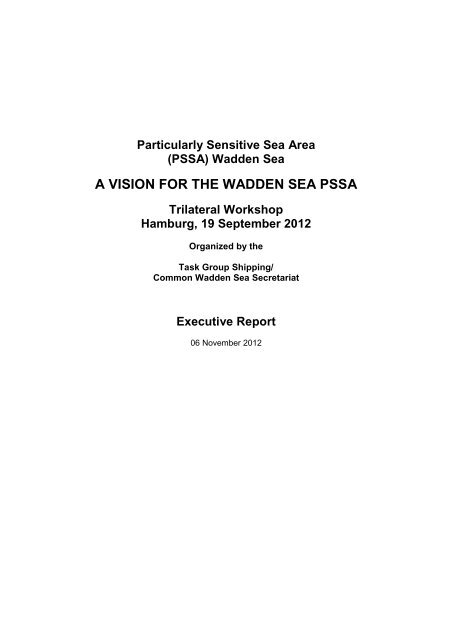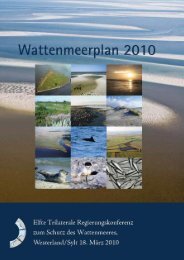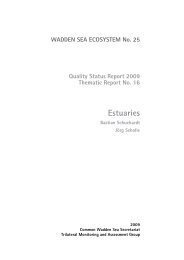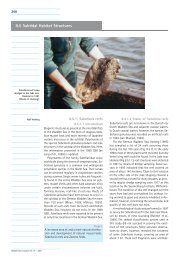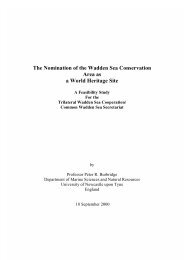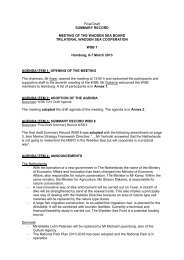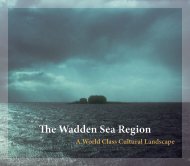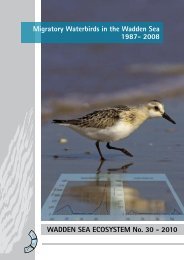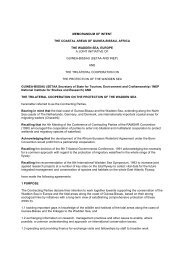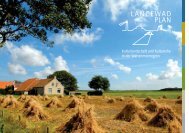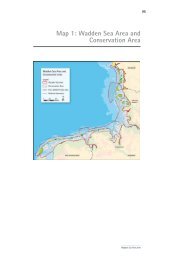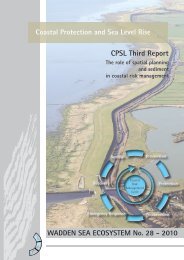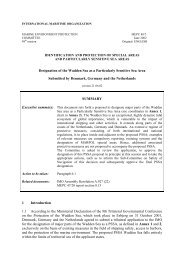PSSA Workshop Report 2012 - Trilateral Wadden Sea Cooperation
PSSA Workshop Report 2012 - Trilateral Wadden Sea Cooperation
PSSA Workshop Report 2012 - Trilateral Wadden Sea Cooperation
You also want an ePaper? Increase the reach of your titles
YUMPU automatically turns print PDFs into web optimized ePapers that Google loves.
Particularly Sensitive <strong>Sea</strong> Area<br />
(<strong>PSSA</strong>) <strong>Wadden</strong> <strong>Sea</strong><br />
A VISION FOR THE WADDEN SEA <strong>PSSA</strong><br />
<strong>Trilateral</strong> <strong>Workshop</strong><br />
Hamburg, 19 September <strong>2012</strong><br />
Organized by the<br />
Task Group Shipping/<br />
Common <strong>Wadden</strong> <strong>Sea</strong> Secretariat<br />
Executive <strong>Report</strong><br />
06 November <strong>2012</strong>
<strong>PSSA</strong> Vision <strong>Workshop</strong> - Executive <strong>Report</strong> (06 November <strong>2012</strong>)<br />
2<br />
1. INTRODUCTION<br />
On 19 September <strong>2012</strong>, the trilateral workshop on the development of a vision for the<br />
<strong>Wadden</strong> <strong>Sea</strong> Particularly Sensitive <strong>Sea</strong> Area (<strong>PSSA</strong>) was held at the Federal Maritime and<br />
Hydrographic Agency in Hamburg. The workshop was organized by the trilateral Task Group<br />
Shipping and the Common <strong>Wadden</strong> <strong>Sea</strong> Secretariat. The workshop was attended by 27<br />
persons representing the competent authorities in the field of maritime shipping and nature<br />
conservation, maritime shipping companies, harbour authorities, nature conservation<br />
organizations and recreational boating. The workshop was chaired by Dr Bernd Scherer,<br />
Deputy Director General, Ministry of Energy Transition, Agriculture, Environment and Rural<br />
Areas, Schleswig-Holstein. A list of participants is in Annex 1.<br />
The chairman opened the workshop and explained the background and objective. It resulted<br />
from the decisions of the Ministerial Council Meeting of the 11 th <strong>Trilateral</strong> Governmental<br />
Conference on the Protection of the <strong>Wadden</strong> <strong>Sea</strong> in 2010. The issue of shipping and ship’s<br />
safety was addressed in §§ 27 – 38 of the Ministerial Council Declaration (Sylt Declaration).<br />
The workshop was a follow up of the first workshop held in May 2011 at which aspects of a<br />
vision for the <strong>Wadden</strong> <strong>Sea</strong> <strong>PSSA</strong> were discussed in terms of awareness and risk. The<br />
objective of this workshop was now “to develop a vision for the <strong>Wadden</strong> <strong>Sea</strong> <strong>PSSA</strong>” as a<br />
central input for the next <strong>Trilateral</strong> Governmental <strong>Wadden</strong> <strong>Sea</strong> Conference to be held on 4-5<br />
February 2014 in Tønder, Denmark, as indicated in the invitation to the workshop.<br />
He looked forward to the presentations and discussions and together with the participants to<br />
develop a vision for the <strong>Wadden</strong> <strong>Sea</strong> <strong>PSSA</strong>. He also acknowledged that this was a challenge<br />
which had not been met so far by a workshop with representatives of very different and partly<br />
also opposing interests. He indicated that the mutual interest in developing a vision for the<br />
<strong>Wadden</strong> <strong>Sea</strong> <strong>PSSA</strong> would be to acknowledge the commercial interests of maritime traffic for<br />
the national economic development including the <strong>Wadden</strong> <strong>Sea</strong> Region, and the necessity of<br />
maritime safety and pollution prevention in conjunction with safeguarding the Outstanding<br />
Universal Value of the <strong>Wadden</strong> <strong>Sea</strong> as expressed in its status as a World Heritage property.<br />
He therefore appealed to the participants to acknowledge the mutual interest in developing a<br />
vision and to refrain from repeating achievements of the past to impede constructive<br />
discussions and the development of a realistic vision.<br />
He underlined that should the workshop fall short of developing a vision, the <strong>Wadden</strong> <strong>Sea</strong><br />
Board, being the central governance organization of the <strong>Trilateral</strong> <strong>Wadden</strong> <strong>Sea</strong> <strong>Cooperation</strong>,<br />
would most probably be forced to develop a vision on its own. In his view it would be<br />
preferable to conclude the work as far as possible on the expert level rather than to pass the<br />
task back to the more political level.<br />
The programme encompassed two main parts:<br />
- A number of presentations of main governmental and non-governmental stakeholders<br />
as a basis for the discussions and vision development; this included a discussion of<br />
the proposals for visions submitted by participants in advance of the workshop.<br />
- The development of a vision during interactive sessions and plenary discussions<br />
The program of the workshop is in Annex 2.
<strong>PSSA</strong> Vision <strong>Workshop</strong> - Executive <strong>Report</strong> (06 November <strong>2012</strong>)<br />
3<br />
2. PRESENTATIONS AND DISCUSSION<br />
Presentations<br />
Mr Huisman, chairman of the Task Group Shipping (TG-S) installed by the <strong>Wadden</strong> <strong>Sea</strong><br />
Board, further introduced the objectives of the workshop and background information<br />
relevant for the development of the vision.<br />
TG-S in its work focuses on not only the <strong>Wadden</strong> <strong>Sea</strong> <strong>PSSA</strong> but also on the wider North <strong>Sea</strong><br />
and maritime activities having an impact on the <strong>PSSA</strong>. It has identified five operational<br />
themes being prevention of accidents, preparedness to respond to accidents should such<br />
happen in spite of prevention measures, reduction of the impacts ensuing from operating<br />
ships, raising the awareness of the <strong>PSSA</strong> and finally cooperation on all levels relevant for the<br />
themes.<br />
TG-S has commissioned the elaboration of a background report (the “Bahlke report”) with the<br />
tasks to provide a forecast of maritime traffic and adjacent area until 2025/2030 and identify<br />
main issues of maritime safety and pollution prevention of shipping for the <strong>Wadden</strong> <strong>Sea</strong><br />
<strong>PSSA</strong>. Some of the findings of the report: From 2000 to 2007, the volume of world<br />
merchandise exports increased with an average of 5.5 % per year. The growth 2005 to 2013<br />
is estimated to encompass almost 75%. Ports adjacent to the <strong>PSSA</strong> would continue to grow<br />
because of the growth in goods but also because of the increasing offshore activities on the<br />
North <strong>Sea</strong> with the rapid extension of offshore wind farming.<br />
The Safety of ships have been further improved by measures by the IMO and the probability<br />
of a most harmful contamination of the <strong>Wadden</strong> <strong>Sea</strong> by an accident, causing the leakage of<br />
fuel oil has been further diminished by even better protection of the hull and piping<br />
arrangements inside the ship. Preventions have been improved and further expanded by the<br />
IMO legal framework and by the EU maritime policy directives. A key element is the<br />
routening measures along the southern boundaries of the <strong>PSSA</strong> and the Vessel Traffic<br />
Services. This will be further improved in the future by e-navigation and maritime spatial<br />
planning.<br />
Effective coordinated response measures exist within the Bonn Agreement and sub-regional<br />
cooperation is warranted within the DenGerNeth Agreement. The current ongoing risk<br />
analysis BE-Aware aims to analyse the current risk and provide a basis for more effective<br />
response measures. Also the impacts has been reduced significantly in recent years by<br />
lower emissions, the Ballast Water Convention, the Lashing@sea project etc. The <strong>PSSA</strong><br />
<strong>Wadden</strong> <strong>Sea</strong> is now indicated on all sea charts to enhance the awareness and companies<br />
should be approached directly but the challenge remain to keep a high level of awareness in<br />
spite of no or very few incidents. Finally he underlined that a very elaborate cooperation<br />
exists on all levels and use should be made of this framework in any future efforts to improve<br />
the situation around the <strong>Wadden</strong> <strong>Sea</strong> <strong>PSSA</strong>. He concluded by pointing out that the vision in<br />
his perspective should combine overall objectives with the five themes and should indicate<br />
level of ambition, what should be done within the IMO and the EU and what the limits are.<br />
Mr Hintzsche, representative of the German Shipowner´s Association (VDR), in his<br />
presentation explained the structure and position of the German merchant fleet which had<br />
significantly increased during recent years measured e.g. in tonnage and now being amongst<br />
the important shipping nations of the world. He further explained the role of the VDR in which<br />
the political work on all levels such as the IMO plays a major role. The maritime cluster now<br />
provides work for some 400,000 persons. Currently also the world economic crisis was felt in<br />
the shipping industry but he emphasized that it should not be exaggerated. Currently 248<br />
ships with ca. 621,500 TEU (Twenty-foot equivalent unit) are layed-up, which relates to only<br />
3,9 % of the total fleet and container ships are still ordered and delivered, e.g Mærsk has<br />
recently been delivered the new 18,000 TEU. It is realistic that even bigger container ships<br />
will be delivered in the future.
<strong>PSSA</strong> Vision <strong>Workshop</strong> - Executive <strong>Report</strong> (06 November <strong>2012</strong>)<br />
4<br />
In terms of the vision discussed today the question is whether zero-emission shipping in the<br />
future would be possible and should be the aim of some future oriented vision. The first<br />
priority should however be maritime spatial planning. He commended the spatial planning of<br />
the German North <strong>Sea</strong> (EEZ) as being very progressive and effective. Shipping lanes are<br />
basic structure of the draft (Art. 60 VII UNCLOS), priority areas have been kept free from<br />
obstacles, reservation of areas where shipping has special weight in the balancing process<br />
and existing traffic has been protected.<br />
In terms of environmental protection shipping is the least environmentally damaging form of<br />
commercial transport and, compared with land based industry, is a comparatively minor<br />
contributor to marine pollution from human activities. There has been a substantial reduction<br />
in marine pollution over the last 15 years, especially with regard to the amount of oil spilled<br />
into the sea, despite a massive increase in world seaborne trade. This is also the result of<br />
cleaner and efficient ships design. The VDR advocates the green shipping approach. There<br />
is further a major potential in new and clean energies from liquid hydrogen offshore<br />
production potential. In 2020, about 3GW generation capacity is assumed to be installed in<br />
offshore wind energy parks in the German Exclusive Economic Zone. Up to 30% of the<br />
generated power may not be put into the grid and could be available for Hydrogen production<br />
(up to 3600 GWh/a). A 500 MW wind farm may produce up to 6.000 t liquid Hydrogen (LH2)<br />
using its surplus power. This could serve 3 feeder vessels. An intermediate storage of LH2<br />
for up to 10 days requires insulated tanks of up to 3000 m 3 .<br />
Mr Vollmer presented the vision of the <strong>Wadden</strong> <strong>Sea</strong> Forum (WSF), a stakeholder<br />
organization of the <strong>Wadden</strong> <strong>Sea</strong> Region working towards a sustainable, balanced<br />
development. The core elements of that vision were a protected and managed North <strong>Sea</strong><br />
through a regional seas approach, safe and clean waters, a balanced use of the available<br />
sea space as well as recognition of the intrinsic value of the natural sea basin. Due to the<br />
heavy and further increasing ship traffic, the traffic management system should be improved.<br />
In this respect, he emphasized the need for traffic separation schemes, the improvement of<br />
control mechanisms, emergency management and awareness raising. Also a sound risk<br />
management and maritime spatial planning with cross-border cooperation and shared<br />
responsibilities had to be implemented respectively applied. To work towards the vision,<br />
further measures like safe cargo storage, implementation of transnational harbor concepts<br />
and the improvement of waste management should be used.<br />
Another focus of the presentation was on emissions and its reduction measures. Shipping<br />
would substantially contribute to CO 2 , NO x , SO 2 and fine particle emissions. He promoted<br />
new standards and parameters in Emission Control Areas (ECAs) and the application not<br />
only in the shipping business but also in gas and oil exploitation. Techniques to reduce the<br />
mentioned emissions would already be available, such as advanced ship designs, filter<br />
systems, alternative fuels and speed reduction, but are not consequently applied by the<br />
industry.<br />
Finally, Mr. Vollmer stressed the application of some relevant policies. The full<br />
implementation of the Bonn-Agreement would be very helpful to strive for safe and clean<br />
waters. Also the application of the EU Maritime Transport Policy according to the recently<br />
elaborated goals and recommendations by the Commission would be a milestone to reach<br />
the expressed vision. Further policies like the Ballast Water Convention and Convention on<br />
anti-fouling systems would be important supporting measures. At the end of the presentation,<br />
he expressed the wish of the WSF for a sound collaboration with the <strong>Trilateral</strong> <strong>Wadden</strong> <strong>Sea</strong><br />
<strong>Cooperation</strong> to work jointly towards a common vision for the North <strong>Sea</strong> with its outstanding<br />
nature reserve <strong>Wadden</strong> <strong>Sea</strong>.<br />
Mr Rösner, representing the World Wide Fund For Nature (WWF), stated that a vision is<br />
needed for guidance how shipping and environment/nature interests can come together. To<br />
protect undisturbed natural processes is the guiding principles for the <strong>Trilateral</strong> <strong>Wadden</strong> <strong>Sea</strong>
<strong>PSSA</strong> Vision <strong>Workshop</strong> - Executive <strong>Report</strong> (06 November <strong>2012</strong>)<br />
5<br />
<strong>Cooperation</strong>. The shipping industry from the conservation point of view is a “loose cannon”<br />
for the protected areas of the <strong>Wadden</strong> <strong>Sea</strong> and accidents can have large scale<br />
consequences for the ecosystem. Furthermore operational pollution is recognized as a<br />
constant risk damage for the environment. Several reports dealing with the <strong>PSSA</strong> <strong>Wadden</strong><br />
<strong>Sea</strong> were conducted. Recent incidents (“Katja”, “Flaminia”) are underlining the risk. In terms<br />
of the trilateral cooperation it should be considered to form one shipping group instead of<br />
two, e.g. by joining the activities of the Task Group and of the <strong>Wadden</strong> <strong>Sea</strong> Forum’s Shipping<br />
Group.<br />
Since major shipping routes are excluded from the <strong>PSSA</strong>, the shipping sector seemed to<br />
consider the <strong>PSSA</strong> as more or less irrelevant, but this would be a biased understanding: As<br />
any incident close to the <strong>Wadden</strong> <strong>Sea</strong> can have major impacts there, the <strong>PSSA</strong> must be<br />
saved from any harm also from outside its limits, which makes the discussion about the exact<br />
borders of the <strong>PSSA</strong> not so relevant. A vision approach should consider economy,<br />
environmental friendliness, concrete APMs (“Associated Protective Measures”) and<br />
improvement of existing safety measures growing with enhanced traffic, even if there is<br />
already a high standard. Some suggestions for commitments or APMs are desirable, e.g.<br />
mandatory tug support for high risk vessels. It is furthermore necessary to strengthen the<br />
trilateral cooperation on these issues. Further discussion on <strong>PSSA</strong> extension is contra<br />
productive for developing a vision.<br />
He presented the following attempt for a possible joint vision:<br />
“The <strong>Wadden</strong> <strong>Sea</strong> is an area of outstanding universal value, being<br />
protected by three countries and by European law and inscribed as a<br />
World Heritage Site by the UNESCO. The IMO has designated the<br />
<strong>Wadden</strong> <strong>Sea</strong> as a "Particularly Sensitive <strong>Sea</strong> Area" (<strong>PSSA</strong>) in the<br />
understanding that harmful influences from shipping on the protected area<br />
must be avoided. This is also very important for the tourism sector.<br />
Shipping in and close to the <strong>Wadden</strong> <strong>Sea</strong> has a large importance for the<br />
economies of our countries and fulfills already a high environmental<br />
standard when compared globally. However, further improvements are<br />
necessary, concerning among others the global standards, the awareness<br />
in the shipping community, a trilateral system for vessel-traffic<br />
management, the coordination between DK DE NL, precautionary<br />
measures and quick reactions on emergencies, a continuous risk<br />
assessment as a basis for measures, and risk reducing efforts in the<br />
context of offshore developments which must ensure that the safety<br />
standard is not weakened.<br />
The <strong>PSSA</strong> <strong>Wadden</strong> <strong>Sea</strong> is also a tool for both the nature and shipping<br />
sector to come together for their <strong>PSSA</strong>, to develop a mutual<br />
understanding and discuss joint issues, with the view to jointly support<br />
necessary changes in regulations and the awareness in the shipping<br />
community.”<br />
Presentation and Discussion Vision Proposals<br />
In advance of the workshop participants had been invited to send in their personal forward<br />
looking visions to help the formulation of a vision at the workshop. Seven visions had been<br />
received which are attached in Annex 3. Because of the relative limited number of visions<br />
these were presented at the workshop by the proposers and discussed in plenary in order to<br />
provide some first ideas of the direction of a vision.<br />
Ms du Bois emphasized that enhancing awareness of the <strong>Wadden</strong> <strong>Sea</strong> <strong>PSSA</strong> is a central<br />
task to further the responsibility of boat owners and other maritime users. Mr de Hoop<br />
supported this issue very much and referred to the responsibility of recreational boat owners<br />
when cleaning their boats. Organizations applying for a power boat race in the World<br />
Heritage area of the Netherlands clearly had not taken a responsibility that is valid for such<br />
an area.
<strong>PSSA</strong> Vision <strong>Workshop</strong> - Executive <strong>Report</strong> (06 November <strong>2012</strong>)<br />
6<br />
Mr Kreß underlined that sustainable development was a leading principle for all policies of<br />
the city of Bremen and should be valid for a vision as well. The vision should not be restrain<br />
and limit economic activities but to show mutual responsibility. Mr de Hoop underwrote this<br />
statement and underlined that sustainable development encompassed economic, social and<br />
environmental development. Economic growth is only possible if the environment is<br />
protected at the same time.<br />
Ms Metzko in the presentation of the vision of the port authorities of Hamburg, Bremen and<br />
Brunsbüttel emphasized that there are sufficient and promising international rules to ensure<br />
safety of international shipping and to reduce its environmental impact also in the vicinity of<br />
the <strong>Wadden</strong> <strong>Sea</strong> <strong>PSSA</strong>. A common approach for a sustainable maritime industry within the<br />
<strong>Wadden</strong> <strong>Sea</strong> <strong>PSSA</strong>, where the German ports should be partners, is therefore necessary.<br />
Mr Cimiotti emphasized in his presentation that only by extending the borders of the <strong>Wadden</strong><br />
<strong>Sea</strong> <strong>PSSA</strong> to include also the main shipping lanes could a successful awareness be made.<br />
Also the moving of the traffic separation scheme further offshore would be necessary to<br />
enhance the safety for the <strong>Wadden</strong> <strong>Sea</strong> <strong>PSSA</strong>. Finally he underlined that the reduction of the<br />
emissions of nitrogen emissions was also a health question for the people living in the<br />
region.<br />
Ms Kuiper underlined in her presentation of the vision of the <strong>Wadden</strong> Society that economic<br />
growth and safety of maritime traffic goes hand in hand. The one is not possible without the<br />
other. Furthermore, a key activity in the coming period is more awareness, improved<br />
cooperation and risk assessment as a basis to better manage threats.<br />
Mr Hintzsche in addition to what he had already outlined in his presentation underlined that<br />
maritime planning is the a key to success in conjunction with the European Safe<strong>Sea</strong>Net-<br />
System as a world-wide reporting system for improved emergency response and increased<br />
efficiency of port logistics in combination with the reduction of reporting workload onboard the<br />
ships. Mr Reijnders questioned whether this would improve safety of maritime traffic<br />
including the <strong>Wadden</strong> <strong>Sea</strong> <strong>PSSA</strong>. Mr Hintzsche argued that this would be an essential<br />
contribution since this would merit a better and more efficient transport of goods e.g. less<br />
waiting times on route and in ports and allow to concentrate more efficiently on safety<br />
requirements and reduce emissions e.g. from more efficient fuel use. This should part of the<br />
vision, he suggested.
<strong>PSSA</strong> Vision <strong>Workshop</strong> - Executive <strong>Report</strong> (06 November <strong>2012</strong>)<br />
7<br />
3. VISION DISCUSSION<br />
Following the presentations and the discussion on the proposed visions the workshop<br />
considered how to develop a vision taking account of the starting points mentioned by the<br />
chairman at the beginning of the workshop. Mr Hintzsche welcomed many of the<br />
observations made during the presentations and discussions and felt that there was a broad<br />
field of agreement between the various positions made. He was particularly pleased with the<br />
vision presented by Mr Rösner, WWF, because he found that there were many points on<br />
which the VDR and the WWF could agree. He therefore suggested that the WWF vision<br />
should be taken as a starting point for the discussion and development of the vision.<br />
This resulted in a discussion on whether this would be an appropriate approach. Ms<br />
Schneider and Mr Litmeyer from the TG-S doubted that it would be possible to come to a<br />
consensus within the limited time given and furthermore, formally speaking the task of<br />
formulating a vision was assigned to the TG-S. Such a proposal could only be a discussion<br />
contribution to the development of vision by the TG-S.<br />
Mr Rösner underlined that the vision outlined was not a vision as it would be formulated<br />
solely by WWF, but based on many years of experience with the <strong>Wadden</strong> <strong>Sea</strong> <strong>PSSA</strong> theme<br />
and as a try to find a joint understanding among the different sectors. He felt that the time<br />
had now come to reach an agreement on a much needed vision of where we want to take<br />
the <strong>Wadden</strong> <strong>Sea</strong> <strong>PSSA</strong>, in a forum where all relevant stakeholders were represented.<br />
The chairman reiterated that the objective of the workshop as agreed with TG-S was to<br />
develop a vision for the <strong>Wadden</strong> <strong>Sea</strong> <strong>PSSA</strong> as a central input for the next <strong>Trilateral</strong><br />
Governmental <strong>Wadden</strong> <strong>Sea</strong> Conference as indicated in the invitation to the workshop. Either<br />
the workshop would accept this task and try to fulfil it, or – at least to his impression - the<br />
WSB would claim the authority to develop a vision for the conference. He again suggested to<br />
reach an agreement on a draft vision.<br />
Finally the proposal made by Mr Hintzsche was agreed to and the meeting went in detail<br />
through the vision proposed by Mr Rösner. With the aim to reach full transparency of the<br />
process and to document the degree of consensus the chairman went finally through the text<br />
– sentence by sentence. After some final amendments there was unanimous agreement on<br />
every part of the draft vision by all participants of the workshop Annex 4.<br />
4. CONCLUSION AND FOLLOW UP<br />
The chairman concluded that an agreement had been reached on a common vision for the<br />
<strong>Wadden</strong> <strong>Sea</strong> <strong>PSSA</strong>. The mission, which he had conceived as being nearly impossible at the<br />
start of the workshop, had been accomplished. He thanked the participants for very<br />
constructive contributions and fruitful discussions and congratulated them to a very fine<br />
outcome.<br />
Ms Kuipers stated that she had problems in acceptance of this as a vision as long as there is<br />
no common understanding of corresponding measures i.e. further APMs have to be<br />
proposed to the IMO. The chairman underlined that the vision constitutes the overall vision<br />
for the <strong>Wadden</strong> <strong>Sea</strong> <strong>PSSA</strong> – in this first step without specification of the possible measures.<br />
It would now be the task of TG-S to develop specific measures to reach the vision<br />
(“operational action plan”) under the 5 themes outlined by the chairman of the TG-S and<br />
report these to the WSB.<br />
A draft report of the meeting would be circulated for comments within the next couple of<br />
weeks. The final report will after review of the comments amending of the report be placed<br />
on the CWSS website together with the presentations and be circulated within the <strong>Wadden</strong><br />
<strong>Sea</strong> <strong>Cooperation</strong>.
<strong>PSSA</strong> Vision <strong>Workshop</strong> - Executive <strong>Report</strong> (06 November <strong>2012</strong>)<br />
8<br />
List of participants<br />
Annex 1<br />
Last name First name Country Authority<br />
Baerends Bernard Netherlands<br />
Ministry for Economics, Agriculture and<br />
Innovations (EL&I)<br />
Bootsmann-Gäbler<br />
Bundesverband der See- und Hafenlotsen<br />
Hans-Jürgen Germany e. V.<br />
Cimiotti Dominic Germany NABU<br />
de Hoop Albert Netherlands Ameland<br />
du Bois Janny Netherlands Watersportverbond<br />
Enemark Jens Common <strong>Wadden</strong> <strong>Sea</strong> Secretariat (CWSS)<br />
State Environmental Ministry of Lower-<br />
Hebbelmann Hubertus Germany Saxony<br />
Hilmer Hartmut Germany<br />
Waterways and Shipping Directorate North<br />
(Kiel)<br />
Hintzsche Wolfgang Germany Association of German Ship Owners, VDR<br />
Hofmann-Ivens Felicitas Germany<br />
Freie und Hansestadt Hamburg, Behörde<br />
für Wirtschaft, Verkehr und Innovation<br />
Huisman Sjon Netherlands North <strong>Sea</strong> Directorate<br />
National Operations Branch, Maritime<br />
Jensen Alex Denmark Environment, Admiral Danish Fleet HQ<br />
Klöpper Sascha Common <strong>Wadden</strong> <strong>Sea</strong> Secretariat (CWSS)<br />
Kress Jochen Germany<br />
Free Hanseatic City of Bremen Senator for<br />
Economic Affairs and Ports (SWH)<br />
Kuipers Ellen Netherlands <strong>Wadden</strong>vereniging<br />
Waterways and Shipping Directorate North<br />
Litmeyer Bernhard Germany West (Aurich)<br />
Meißner Ute Germany<br />
Free Hanseatic City of Bremen Senator for<br />
Economic Affairs and Ports (SWH)<br />
Reinders Geert-Jan Netherlands Groningen <strong>Sea</strong> Port<br />
Rösner Hans-Ulrich Germany WWF<br />
Scheiffarth Gregor Germany<br />
Nationalparkverwaltung Niedersächsisches<br />
Wattenmeer<br />
Scherer Bernd Germany<br />
Ministerium für Energiwende,<br />
Landwirtschaft, Umwelt und ländliche<br />
Räume<br />
Schneider Christina Germany<br />
Waterways and Shipping Directorate North<br />
(Kiel)<br />
Stoldt Michael Germany Deutscher Seglerverband (DSV)<br />
Vader Martine Netherlands KWC (Dutch Coast Guard)<br />
Vollmer Manfred Germany <strong>Wadden</strong> <strong>Sea</strong> Forum Shipping Group<br />
Wild-Metzko Sonja Germany Hamburg Port Authority<br />
Jensen Torben Denmark Esbjerg Harbour Authority
<strong>PSSA</strong> Vision <strong>Workshop</strong> - Executive <strong>Report</strong> (06 November <strong>2012</strong>)<br />
9<br />
<strong>Workshop</strong> programme<br />
Annex 2<br />
<strong>Trilateral</strong> <strong>Workshop</strong> on<br />
Vision Development for the<br />
Particular Sensitive <strong>Sea</strong> Area (<strong>PSSA</strong>) <strong>Wadden</strong> <strong>Sea</strong><br />
Hamburg<br />
Bundesamt für Seeschifffahrt und Hydrographie, Bernhard-Nocht-Str. 78<br />
19 September <strong>2012</strong><br />
9:30 – 16:30 h<br />
PROGRAMME<br />
Chair: Bernd Scherer, Deputy-Director General, Ministry of Energy Turnaround, Agriculture,<br />
Environment and Rural Areas of the State of Schleswig-Holstein<br />
9:00 – 9:30 Registration / tea and coffee<br />
9:30 – 9:40 Bernd Scherer Opening<br />
9:40 – 9:50 Sjon Huisman<br />
(Rijkswaterstaat Nordzee)<br />
9:50 – 10:10 Wolfgang Hintzsche<br />
(Association of German Ship<br />
Owners, VDR)<br />
10:10 – 10:30 Manfred Vollmer (<strong>Wadden</strong><br />
<strong>Sea</strong> Forum)<br />
10:30 – 10:50<br />
Hans-Ulrich Rösner (WWF)<br />
Introduction, Objectives of the <strong>Workshop</strong><br />
Vision Shipping Section<br />
10:50 – 11:10 Coffee break<br />
Vision <strong>Wadden</strong> <strong>Sea</strong> Forum<br />
Vision Nature Conservation<br />
11:10 – 11:30 CWSS Presentation vision proposals participants,<br />
proposal for discussion themes<br />
11:30 –12:15 Plenary Exchange of views / first round of discussion on<br />
the different approaches<br />
12:15 – 13:15 Lunch in BSH cafeteria<br />
13:15 – 14:15 Breakout session Vision development, interactive discussion in 3-4<br />
groups<br />
14:15 – 15:15 Plenary Presentation break out session / discussion /<br />
agreement on elements vision<br />
15:15 – 15:30 Coffee Break<br />
15:30 – 16:15 Bernd Scherer Revisit vision development and discussion of<br />
overall vision<br />
16:15 – 16:30 Bernd Scherer Final announcements, <strong>Workshop</strong> closing
<strong>PSSA</strong> Vision <strong>Workshop</strong> - Executive <strong>Report</strong> (06 November <strong>2012</strong>)<br />
10<br />
Annex 3<br />
Visions sent by participants<br />
Janny du Bois (Watersportverbond)<br />
The <strong>Wadden</strong>sea 2030; some remarks from the perspective of active sailors in the region.<br />
We don’t expect larger groups of yachts for the next years, but new people will discover the<br />
area: we want them to absorb the principles of the “Code of Honor” to develop respect for<br />
Wad-nature (I explained this “Code of Honor” in the <strong>PSSA</strong>-workshop 2011).<br />
Marinas with more berth, are not needed. More attention for safety is urgent: in summertime<br />
harbors are often overcrowded, which asks for appropriate safety-measures and updated<br />
plans e.g. paying attention to the fire situation.<br />
Other branches of tourism will grow:<br />
- Tourist boat-trips<br />
- Rental yachts<br />
- Rib-trips<br />
- Water taxis, for instance for island hopping<br />
They need all special treatment to develop their respect to nature.<br />
It is necessary to improve awareness by personal education:<br />
- by courses (good approach for motivated people, they will take in the information<br />
voluntarily<br />
- by personal approach in the area (see and learn by experience)<br />
The goal: foster responsibility of visitors to the natural beauty when visiting the <strong>Wadden</strong>sea.<br />
Better maintaining order (for the obstinate).<br />
In our vision awareness and responsibility are the first parts of the chain: and that also<br />
means more space for the good-willing people. Order is needed as the last link in the chain.<br />
More order in the area instead of restrictions (we experience now more restrictions because<br />
the order cannot be realized)<br />
- Better collaboration between services in the area<br />
Goal: those who are not following the rules will be punished, others are more free in enjoying<br />
the <strong>Wadden</strong>sea-nature.<br />
Point of interest:<br />
The <strong>Trilateral</strong> countries do not act in an uniform systems. People are sailing from one country<br />
to another, but the rules are different.<br />
Janny du Bois-Minholts, Watersportverbond, September <strong>2012</strong><br />
Jochen Kreß (Der Senator für Wirtschaft, Arbeit und Häfen. Referat Umweltangelegenheiten,<br />
Energiepolitik, Land- und Ernährungswirtschaft, Verbraucherfragen)<br />
It was requested to give a vision for the <strong>PSSA</strong> North <strong>Sea</strong> prior to the workshop which takes<br />
place on 19 th of September at BSH in Hamburg.<br />
The Free Hanseatic City of Bremen follows the principle of sustainable development in all<br />
aspects. In its Environment policy statement for the ports of Bremen the Senator for<br />
Economic Affairs and Ports has declared to follow sustainability with regard to the ports of<br />
Bremen/Bremerhaven in many details.
<strong>PSSA</strong> Vision <strong>Workshop</strong> - Executive <strong>Report</strong> (06 November <strong>2012</strong>)<br />
11<br />
If this applies to the ports, this should apply equally to shipping on the routes to the ports.<br />
Sustainability contains the aspect of economic welfare. This means that shipping will have to<br />
play a major role for the development of the federal state Bremen and must not be curbed<br />
down, especially with regard to competition between the German and the West European<br />
ports.<br />
On the other side it is clear that shipping has to take considerations of the high ecological<br />
value and the outstanding importance of the <strong>Wadden</strong> <strong>Sea</strong> and has to act in an environmental<br />
friendly way which is a major keystone of sustainability. Shipping has made considerable<br />
progress as regards its environmental performance during the last years. This development<br />
goes on and will be enhanced by the widespread use of new alternative technology, e.g.<br />
LNG. So I see that shipping will have reduced its environmental impact furthermore<br />
considerably in 2030 and a responsible partnership between shipping and environmental<br />
concerns will have been developed.<br />
Sonja Wild-Metzko, (Hamburg Port Authority)<br />
Visions for the Particular Sensitive <strong>Sea</strong> Area (<strong>PSSA</strong>) <strong>Wadden</strong>sea until 2030 by the Hamburg<br />
Port Authority, bremenports, Niedersachsen Ports and Brunsbüttel Ports<br />
Within the international maritime sector a big variety of regulations by IMO, the EU policy, the<br />
MARPOL Convention, OSPAR and other constant efforts of the shipping sector as well as of<br />
the Ports (e.g. greenports-inititative by Bremen) contribute to a sustainable development with<br />
ecological improvements and thereby positive impacts on the <strong>PSSA</strong> <strong>Wadden</strong>sea:<br />
In the sector of energy efficiency IMO has developed the Energy Efficiency Design Index<br />
(EEDI) and the Energy Efficiency Operational Indicator (EEOI), both to increase the<br />
efficiency and to reduce the fuel consumption on ships. More efficiency on board of ships<br />
leads to less ship emissions of CO 2 , NOx, SOx and PM, as well as added propulsion<br />
systems like sky sails, the usage of renewable energies (photovoltaic e.g.) or slow steaming.<br />
Regarding fuel quality there are fundamental rules listed in the MARPOL Convention as well<br />
as EU-regulations take effect with the target to reduce ship emissions in general and in<br />
special within the emission controlled areas (ECA). Alternative fuels like LNG (liquefied<br />
natural gas) to reach required specifications in ECA are being implemented. The Ports<br />
support any helpful step to introduce LNG as a low-emission fuel that could replace heavy<br />
fuel oil with all its impacts on environment.<br />
The Green Shipping initiative is an example for the constant efforts of the shipping sector to<br />
lower environmental impacts. Also port authorities founded initiatives like Ecoports and the<br />
World Port Climate Initiative (WPCI) to improve the environmental situation in ports,<br />
surrounding areas and the transport chain. In this context HPA, bremenports and Brunsbüttel<br />
Ports introduced the Environmental Ship Index (ESI) and give incentives for ships with lower<br />
emissions than requested. Niedersachsen Ports is preparing next years` introduction of ESI<br />
in its ports. German Ports are engaged in the field of environmental management, e.g. the<br />
Ports of Bremen/Bremerhaven are the first German ports that were certified for their<br />
environmental management according to the PERS-standard. Other environmental fields<br />
contain accordant to IMO regulations the reduction of oil spills through technical solutions,<br />
use of bio degradable oil as lubricant or bio-fuel.<br />
According to MARPOL garbage treatment the North <strong>Sea</strong> is designated as a “special area”.<br />
In every German port reception facilities are in place. Further investigation is definitely<br />
necessary to come to further improvements.<br />
Noise regulations also to reduce underwater sound will be revised by IMO.
<strong>PSSA</strong> Vision <strong>Workshop</strong> - Executive <strong>Report</strong> (06 November <strong>2012</strong>)<br />
12<br />
With the ratification of the IMO Ballast Water Management Convention in <strong>2012</strong> an<br />
international instrument for the treatment and handling of ballast water will come into place.<br />
Further the Water Framework Directive (WFD) and the Marine Strategy Directive (MSD) will<br />
contribute with their programs of measures to improve the chemical and ecological status of<br />
the <strong>Wadden</strong>sea within the coming decades.<br />
The Maritime Spatial Planning (MSP) coordinates the spatial conflicts between different uses<br />
as offshore wind farms, shipping, nature conservation and others and thereby contributes to<br />
the future safety of shipping activities and thus for the adjacent <strong>Wadden</strong>sea <strong>PSSA</strong>.<br />
There are sufficient and promising international rules to ensure safety and security of<br />
marine transport and to reduce its environmental impact, also on the <strong>Wadden</strong> <strong>Sea</strong>. In<br />
our vision for the German bight we promote coexistence of all ecosystem services<br />
and uses in the <strong>Wadden</strong> <strong>Sea</strong> until and after 2030. Therefore we need a common<br />
approach for a sustainable maritime industry within a unique and sensitive <strong>Wadden</strong><br />
<strong>Sea</strong> area, where the German sea ports and shipping should be partners 1 and not a<br />
threat.<br />
1 Compare the cooperation between bremenports and the National park management <strong>Wadden</strong> <strong>Sea</strong> of Lower<br />
Saxony: http://www.bremenports.de/en/greenports/news-from-our-partners<br />
Dominic Cimiotti (Naturschutzbund Deutschland e.V. - NABU)<br />
My vision for the <strong>PSSA</strong> <strong>Wadden</strong> <strong>Sea</strong><br />
The recent accident (and near disaster) of oil-tanker “Katja” demonstrated the threat and<br />
need for an effective protection of the <strong>PSSA</strong> <strong>Wadden</strong> <strong>Sea</strong>. Therefore the <strong>PSSA</strong> should be<br />
extended to include the shipping routes to the harbors and along the <strong>Wadden</strong> <strong>Sea</strong>. Shipping<br />
safety has to be improved by concrete measures such as obligatory pilots on board and<br />
higher capacities of powerful emergency towing vessels. Furthermore people and marine<br />
environment in and around the <strong>PSSA</strong> should be protected by obligatory soot particle filters<br />
and selective catalysers to reduce nitrogen oxide emissions for all ships. On the medium<br />
term ships should not longer carry heavy crude passing the <strong>PSSA</strong>. My vision for the <strong>PSSA</strong><br />
<strong>Wadden</strong> <strong>Sea</strong> is an area where people and nature can exist without fearing heavy pollution<br />
from the sea.<br />
Ellen Kuipers (<strong>Wadden</strong> <strong>Sea</strong> Society)<br />
Personal <strong>PSSA</strong> <strong>Wadden</strong> <strong>Sea</strong> Vision<br />
The <strong>Wadden</strong> <strong>Sea</strong> is a very sensitive sea which is shown through the classification of the area<br />
as a <strong>PSSA</strong> by the IMO. The need to take more proactive measures to ensure the safety at<br />
sea and to protect its surroundings becomes more urgent every day due to the increased<br />
maritime traffic and offshore activities. These pose a potential risk not only to the<br />
environment but also to the quality of life along the coastal zones around the <strong>Wadden</strong> <strong>Sea</strong>.<br />
That’s the reason the <strong>Wadden</strong> <strong>Sea</strong> Society wishes that in 2030 the <strong>Wadden</strong> <strong>Sea</strong> is a<br />
forerunner on maritime safety and serves as a good example to other states how <strong>PSSA</strong> can<br />
help to increase maritime safety.<br />
We use the <strong>PSSA</strong> framework in an effective way. New APM’s will be developed and<br />
implemented according to assessments of threats and vulnerability based on changes in<br />
shipping and offshore activities and the latest scientific/technical knowledge. Therefore there
<strong>PSSA</strong> Vision <strong>Workshop</strong> - Executive <strong>Report</strong> (06 November <strong>2012</strong>)<br />
13<br />
is an excellent cooperation between (inter)national, regional and local actors and authorities.<br />
Regional and local actors are the ones who best know the situation in their adjacent coastal<br />
zone and who best can assess the need for which kind of protective measures that needs to<br />
be taken. National authorities on the other hand are the only actors who could propose new<br />
APM’s to the IMO.<br />
In short we need:<br />
• Raise awareness about the <strong>PSSA</strong> framework / Raise training standards for seafarers<br />
and coastal communities<br />
• Improve and extend common monitoring, navigational and vessel equipment<br />
solutions for the whole region which can affect the <strong>Wadden</strong> <strong>Sea</strong>.<br />
• Increase interregional cooperation and consult regional and local actors in order to<br />
get an assessment of threats and vulnerability.<br />
• Develop adequate solutions to the threats within the possibilities given from the <strong>PSSA</strong><br />
framework and forward proposals of new APM’s to the IMO<br />
Wolfgang Hintzsche (German Shipowners’ Association -VDR)<br />
Shipping Vision for the <strong>PSSA</strong> <strong>Wadden</strong>sea until 2030<br />
by the German Shipowners’ Association (VDR)<br />
The basis for the future safety of shipping and for the free entry to German Ports lays in the<br />
Maritime Spatial Planning (MSP) which coordinates the spatial conflicts between different<br />
uses as offshore wind farms, shipping, nature conservation and others and thereby<br />
contributes for the adjacent <strong>Wadden</strong>sea <strong>PSSA</strong>.<br />
Within the international maritime sector a big variety of regulations by IMO, the EU policy, the<br />
SOLAS and MARPOL Conventions, OSPAR, HELCOM and other constant efforts of the<br />
shipping sector contribute to a sustainable development with ecological improvements and<br />
thereby positive impacts on the <strong>PSSA</strong> <strong>Wadden</strong>sea: Shipping is the least environmentally<br />
damaging form of commercial transport and, compared with land based industry, is a<br />
comparatively minor contributor to marine pollution from human activities. There has been a<br />
substantial reduction in marine pollution over the last 15 years, especially with regard to the<br />
amount of oil spilled into the sea, despite a massive increase in world seaborne trade.<br />
It is estimated that land based discharge (sewage, industrial effluent and urban/river run off<br />
etc.) and atmospheric inputs from land industry sources account for some 77% of marine<br />
pollution generated from human activities. In contrast, maritime transport is only responsible<br />
for some 12% of the total. However, these United Nations estimates were produced in 1990<br />
and the proportion of marine pollution that can be attributed to shipping is now thought to be<br />
much lower than 10%.<br />
The shipping industry is a small contributor to the total volume of atmospheric emissions<br />
compared to road vehicles and air transport as well as public utilities such as power stations,<br />
and atmospheric pollution from ships has reduced in the last decade.<br />
There have been significant improvements in engine efficiency and hull design, and the use<br />
of ships with larger cargo carrying capacities have led to a reduction in emissions and an<br />
increase in fuel efficiency. Meanwhile, improvements in hull design and slowsteaming have<br />
led to further reductions in fuel oil consumption with consequent reductions in air pollution.<br />
The latest marine engines give a 30%-40% reduction in discharges of nitrogen oxide, with<br />
reductions of 80% likely in the future.<br />
The impact of SOx emissions has been dramatically reduced worldwide from 4.5% to 0.5%<br />
sulphur content in fuel by 2025 and to 0,1% sulphur content in SECA’s/ECA’s by 2015.
<strong>PSSA</strong> Vision <strong>Workshop</strong> - Executive <strong>Report</strong> (06 November <strong>2012</strong>)<br />
14<br />
In terms of CO 2 emissions per tonne of cargo transported one mile, shipping is recognised as<br />
the most efficient form of commercial transport. However, the enormous scale of the industry<br />
means that it is nevertheless a significant contributor to the world's total greenhouse gas<br />
emissions (around 3% of total global CO 2 emissions). The industry is therefore closely<br />
involved in global discussions on ships' CO 2 emissions now being firmly led by IMO, and has<br />
worked to develop proposals for maritime transport in advance of the UNFCCC conferences<br />
on climate change.<br />
The industry has also been exploring other possible solutions, such as the increasing use of<br />
alternative fuels like LNG, although for the foreseeable future fossil fuels will probably<br />
continue to be the predominant source of power for the majority of the industry. Alternatively<br />
the industrial production of Methan through the process of combining Hydrogen and CO 2 by<br />
means of Offshore Windpower has been further developed.<br />
The Green Shipping initiative is an example for the constant efforts of the shipping sector to<br />
lower environmental impacts. According to MARPOL garbage treatment the North <strong>Sea</strong> is<br />
designated as a “special area”. In every German port reception facilities<br />
are in place.<br />
Noise regulations also to reduce underwater sound have been introduced by IMO.<br />
With the ratification of the IMO Ballast Water Management Convention end of <strong>2012</strong> an<br />
international instrument for the treatment and handling of ballast water has come into place<br />
and the installation of Ballast Water Treatment Systems has been successfully performed to<br />
all ships.<br />
The European Safe<strong>Sea</strong>Net-System has been introduced as an worldwide <strong>Report</strong>ing<br />
System for improved emergency response, increased efficiency of port logistics and<br />
reduction of <strong>Report</strong>ing workload onboard the ships.<br />
There are sufficient and promising international rules to ensure safety and security of<br />
marine transport and to reduce its environmental impact, also on the <strong>Wadden</strong> <strong>Sea</strong>. In<br />
our vision for the German bight we promote coexistence of all ecosystem services<br />
and uses in the <strong>Wadden</strong> <strong>Sea</strong> until and after 2030. Therefore we need a common<br />
approach for a sustainable maritime industry within a unique and sensitive <strong>Wadden</strong><br />
<strong>Sea</strong> area, where the German sea ports and shipping should be partners and not a<br />
threat.
<strong>PSSA</strong> Vision <strong>Workshop</strong> - Executive <strong>Report</strong> (06 November <strong>2012</strong>)<br />
15<br />
Annex 4<br />
A Vision for the <strong>PSSA</strong> <strong>Wadden</strong> <strong>Sea</strong><br />
The <strong>Wadden</strong> <strong>Sea</strong> is an area of outstanding universal value, being protected by three<br />
countries and by European law and inscribed as a World Heritage Site by the UNESCO.<br />
The IMO has designated the <strong>Wadden</strong> <strong>Sea</strong> as a "Particularly Sensitive <strong>Sea</strong> Area" (<strong>PSSA</strong>) in<br />
the understanding that harmful influences from maritime activities on the protected area must<br />
be avoided. Maritime activities in the <strong>Wadden</strong> <strong>Sea</strong> and the adjacent waters of the North <strong>Sea</strong><br />
have a large importance for the economies of our countries and fulfill already a high<br />
environmental standard when compared globally. However, through the coordination<br />
between Denmark, Germany and the Netherlands future improvements will be necessary,<br />
concerning among others:<br />
• the global safety and environmental standards<br />
• the awareness of maritime and other stakeholders<br />
• further implementation of international vessel reporting and monitoring for improved<br />
safety and efficiency of navigation and emergency response<br />
• a continuous risk assessment as a basis for precautionary measures and adequate<br />
response on emergencies<br />
• risk reducing efforts in the context of offshore developments which must ensure that<br />
the safety standard is maintained<br />
• Initiate further cooperation on marine spatial planning between North <strong>Sea</strong> coastal<br />
states<br />
The <strong>PSSA</strong> <strong>Wadden</strong> <strong>Sea</strong> is also a tool for both the nature conservation and maritime sector to<br />
come together for their <strong>PSSA</strong>, to develop a mutual understanding and discuss joint issues,<br />
with the view to jointly support necessary changes in regulations and the awareness among<br />
maritime and other stakeholders.
<strong>PSSA</strong> Vision <strong>Workshop</strong> - Executive <strong>Report</strong> (06 November <strong>2012</strong>)<br />
16<br />
Vision with tagged changes<br />
A Vision for the <strong>PSSA</strong> <strong>Wadden</strong> <strong>Sea</strong> an Attempt<br />
The <strong>Wadden</strong> <strong>Sea</strong> is an area of outstanding universal value, being protected by three<br />
countries and by European law and inscribed as a World Heritage Site by the UNESCO.<br />
The IMO has designated the <strong>Wadden</strong> <strong>Sea</strong> as a "Particularly Sensitive <strong>Sea</strong> Area" (<strong>PSSA</strong>)_-in<br />
the understanding that harmful influences from shipping maritime activities on the protected<br />
area must be avoided. This is also very important for the tourism sector.<br />
Shipping Maritime activities in and close to the <strong>Wadden</strong> <strong>Sea</strong> and the adjacent waters of the<br />
North <strong>Sea</strong> has have a large importance for the economies of our countries and fulfill already<br />
a high environmental standard when compared globally.<br />
However, through further the coordination between DK DE NL future improvements are will<br />
be necessary,. concerning among others<br />
,<br />
the global safety and environmental standards,<br />
the awareness in theof shipping maritime and other stakeholderscommunity,<br />
a trilateral system for vessel traffic management,<br />
further implementation of international vessel reporting and monitoring for improved safety<br />
and efficiency of navigation and emergency response.<br />
the coordination bewtween DK DE NL, precautionary measures and quick reactios on<br />
emergencies,<br />
a continuous risk assessment as a basis for precautionary measures and adequate response<br />
on emergencies,<br />
and risk reducing efforts in the context of offshore developments which must ensure that the<br />
safety standard is not weakened maintained.<br />
Initiate further cooperation on marine spatial planning between North <strong>Sea</strong> coastal states.<br />
The <strong>PSSA</strong> <strong>Wadden</strong> <strong>Sea</strong> is also a tool for both the nature conservation and shippingmaritime<br />
sector to come together for their <strong>PSSA</strong>, to develop a mutual understanding and discuss joint<br />
issues, with the view to jointly support necessary changes in regulations and the awareness<br />
among in the shippingmaritime community and other stakeholders.


